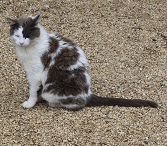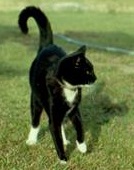Love cats? Work with cats? Want your own business?
Domestic Cat Care is a comprehensive 100 hour course covering all aspects of diet and nutrition, preventative health care and treating illnesses, understanding feline behaviour, breeding, business planning and more..!
- Developed with the feline professional or cat enthusiast in mind
- An experiential learning experience designed to help you develop knowledge and skills to work with cats confidently
- Be familiar with the scope of the feline industry and the services available
- If you're thinking about cat care specifically as a new income stream or employment option, this course will assist you to demonstrate your ability to work with cats and understand the industry without question
An extensive course for cat lovers and professionals
-
 Learn about cat behaviour.
Learn about cat behaviour.
- Understand the requirements for a heathy cat - diet, nutrition, preventative care and treating of illnesses.
- Learn from our expert tutors.
- Course Duration: 100 hours of self paced study. Start at any time; study from home or where you want to.
There are 9 lessons in this course. Each lesson will take around 11 hours to complete. Each lesson is made up of a combination of reading and research, a set task activity, an assignment which is submitted to your tutor and a short self-assessment test (online students only).
COURSE STRUCTURE AND CONTENT
Course Duration: 100 hours.
Start Date: Start at any time - study at a pace that suits you, and with full tutor support for the duration of your studies.
Lessons: The course comprises 9 lessons as detailed, below.
- Introduction
- Basic Feline Needs - Basic Duties of the Cat Owner.
- Food and water.
- Shelter and Containment.
- Health care for sick cat.
- Grooming.
- Claw trimming.
- Bathing.
- Travel.
- Housebreaking.
- Introducing a new cat at home.
- Cats with babies and children.
- Cats and dogs.
- Cat breeds: pedigrees and non-pedigrees.
- Feline Biology
- Skin.
- Eyes.
- Ears.
- Nose.
- Mouth.
- Digestive system.
- Reproductive system.
- Breeds
- Domestic cat breeds.
- International and national associations.
- Long haired breeds – characteristics, common health problems, temperaments, care, history.
- Semi-long haired breeds - characteristics, common health problems, temperaments, care, history.
- Short haired breeds - characteristics, common health problems, temperaments, care, history.
- Feline Health Care
- Preventative care.
- Vaccinations.
- Recognising illhealth.
- Dealing with emergencies.
- Artificial breathing and heart massage.
- How to induce vomiting.
- Specific situations to deal with e.g. burns, wounds, dehydration, hypothermia (and many more).
- Poisoning.
- Wounds.
- Bandaging.
- Restraining for treatment.
- Transportation of the injured cat.
- Desexing.
- Feline Illnesses
- Internal parasites.
- Roundworms.
- Hookworms.
- Tapeworms.
- Whipworms.
- Lungworms.
- Stomach worms.
- Bladder worms.
- Flukes.
- Worm control.
- External parasite.
- Ticks.
- Fleas.
- Mites.
- Common ailments and diseases (numerous).
- Skin disorders.
- Feline Diet
- Introduction to foods and feedings.
- Dietary options.
- Free feeding.
- Scheduled, portion controlled feeding.
- Understanding dietary requirements.
- Kittens (0-12 months).
- Pregnant and lactating cats.
- Fussy cats.
- Obesity and overweight cats.
- Underweight cats.
- Geriatric cats.
- Raw diets.
- Toxic foods.
- Feline Behaviour
- Understanding the cats mind.
- Personality and temperament differences.
- How cats communicate.
- Body language.
- Sleeping routines and circadian rhythms.
- Play.
- Behavioural problems.
- Recognise and understand aggression.
- Dealing with aggression.
- Inappropriate elimination.
- Excessive vocalisation.
- Geriatric dysfunction.
- Controlling killing wildlife.
- Eating disorder.
- Abnormal suckling.
- Separation anxiety.
- Breeding and Raising Kittens (includes PBL Project)
- Cat breeding industry.
- Ethics in animal breeding.
- A brief look at genes.
- Sexual behaviour.
- Socialisation of kittens.
- Problem based learning project – Improving Standards for Ethical Breeding.
- Feline Services (includes PBL Project)
- Grooming services.
- Professional training and handling.
- Day care or boarding facilities.
- Rehoming and fostering.
- Using cats as therapy pets.
- Health care industry.
- Feline therapy services – hydrotherapy, physiotherapy, massage.
- Retail and manufacturing industry.
- Pet funerals and memorials.
- Business basics for self-employment in the feline industry.
- Laws and small business.
- The importance of keeping records.
- Buying an established business.
- Buying a franchise.
- Approaches to business planning.
- Problem based learning project – Starting a Small Business in the Cat Industry.
LEARNING AIMS
-
Investigate aspects of domestic cat care and the basic duties of owners and professional carers.
-
Develop understanding of basic biology – anatomy and physiology – and associated processes.
-
Examine variations between different breeds by focusing on common health issues, temperaments and characteristics.
-
Recommend different preventative care schedules and learn how to recognise and treat ill health.
-
Develop clear understanding of parasites, ailments and disease, treatment options available and the significance of veterinary assistance.
-
Investigate feline nutrition and outline an appropriate diet for the domestic cat specific to their needs.
-
Distinguish between normal and abnormal cat behaviour, extending this to develop appropriate strategies for dealing with problem or undesirable behaviours.
-
Assess the current breeding industry and demonstrate ethical standards in cat breeding and rearing kittens.
-
Investigate and evaluate services which exist in the current cat industry and propose a small business idea which is of personal interest.
HOW THE COURSE WORKS
You can start the course at any time.
It is studied by distance learning, so you can study in the comfort of your own home. But this doesn't mean you are all alone in your studies. Our highly qualified and friendly tutors are there to help you every step of the way. If you have any questions at all, they are always happy to help.
On the successful completion of the 9 lessons you will receive a Letter of Completion awarded by the school.
Or, if you decide to sit the exam and formalise your study, you will
receive a Statement of Attainment in Domestic Cat Care (on successfully
passing the exam).
The third option is to continue your
study - you may choose to go on to further pet industry or animal care
qualifications, such as a certificate or diploma.
Where could this course lead you?

- Employment in a pet care retail environment.
- A foundation to working in animal health care - have you thought of a potential veterinarian career?
- A first step to further education in the animal welfare field.
- A basis for starting your business in cat care - maybe you dream of running boarding facilities?
- Professional breeding and showing.
So you're interested in studying cats and
caring for cats ... you could have a chat with one of our course
advisers who can tell you more about studying with us. Or you could get
started today and take yourself on a new path!
The future is only limited by your imagination.
WHAT NEXT?
Register to Study - Go to “It’s Easy to Enrol” box at the top of the page and you can enrol now.
or
Get Advice – Email us at info@acsedu.co.uk OR
Use our FREE COUNSELLING SERVICE to contact a tutor
CLICK TO CONTACT US